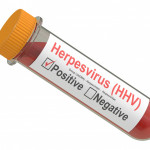Researchers have discovered that some herpes viruses can reduce the ability of cells to shut themselves down or die, which is critical to halting the development of cancers such as lymphoma and Kaposi’s sarcoma (KS). Their findings are published in the April 2 issue of The EMBO Journal.
It is well known that certain common gamma herpes viruses are associated with the development of cancer, such as the Epstein-Barr virus with Burkitt’s lymphoma and human herpesvirus-8 (HHV-8) with KS. Until now, however, scientists have not been able to explain how the viruses could cause cancer.
To examine the potential mechanisms by which gamma herpes viruses could cause cancer, Lénia Rodrigues, from the Universidade de Lisboa, in Portugal, and her colleagues investigated proteins produced by the murid herpesvirus-4—a virus related to Epstein-Barr and HHV-8. Specifically, Rodrigues and her team looked at a specific protein produced by the herpes virus called ORF73.
The team found that ORF73 was able to suppress the ability of cells to produce NF-kappa B (NF-kB), a protein critical to the growth and proliferation of new cells, and the dying off of defective cells. While some cancers and inflammatory diseases are caused by too much NF-kB activity, other cancers caused by viruses may be caused by the suppression of NF-kB.
The authors explain that viruses like HHV-8 and Epstein-Barr can live on in the body and multiply more easily when NF-kB is suppressed. Further research is needed first, however, to confirm the authors’ findings.
Advertisement
Advertisement
Advertisement






Comments
Comments